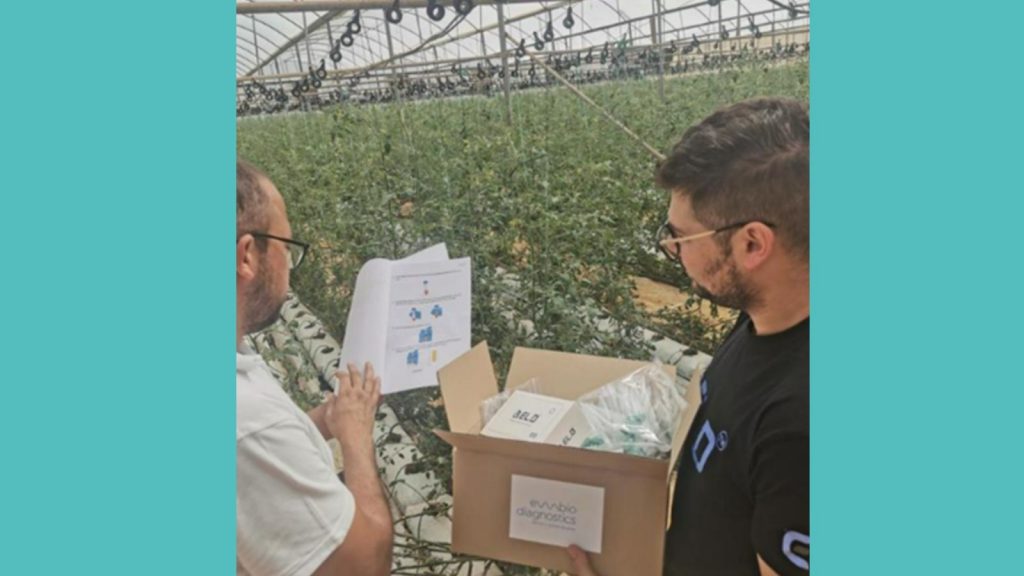
PENFA (Pesticide Environmental Fate Analysis) was one of the five successful pilots chosen to join the DEMETER project as part of Open Call #2 DEPLOY.
The PENFA project aims to introduce an innovative approach for the growing challenge of safe primary production of greenhouse vegetables, and as a result, mitigate the public health risk. PENFA project aims to demonstrate a highly innovative and interoperable system that will be able to integrate data from the ambient environment of greenhouses with the diagnostic data derived from BELD (BioELecticDiagnostics) device, regarding pesticide residues in critical growth stages, to enable and empower growers to perform optimal pesticide use in the critical fragment of greenhouse horticulture. The project took place in three farms in southern Cyprus that work together within the framework of the farmers’ cooperative AgPlus Consultings.
We spoke with Theofylaktos Apostolou (TA) from EMBIO Diagnostics, and Aristos Onisiforou (AO) from AGROPLUS CONSULTANTS LTD about their work on the PENFA project and their thoughts on farming and digital technology.
SK EMBIO Diagnostics Ltd [Project Coordinator], is a biotechnology company, licensed and operating in the Republic of Cyprus, that designs and develops full custom-based hardware and software solutions that can address rapid detection requirement in food safety, environmental testing, and health industry at a global level. EMBIO Diagnostics has played a key role in the evolution of screening technology and is now advancing its vision of portable diagnostics. EMBIO designs and develops state-of-the-art devices that operate on the internet of things (IoT) procedures.
AgPlus Consultants Ltd is a farmers’ association comprising of more than 200 farmers from Cyprus and mainly focused on vegetable growing, currently indoor (greenhouse) and outdoor growing. In the PENFA project, AgPlus Consultants was a technology adopter and end-user.
Can you outline the technology you develop for the Agri sector and the benefits they provide?

Theofylaktos Apostolou, EMBIO Diagnostics
TA- The PENFA project developed a highly innovative and interoperable system for the agricultural sector. The aim was to support decision-making on pesticide use among agricultural producers, through the identification of the plant’s response to environmental stress conditions that affect pesticide breakdown, by monitoring, measuring, and analyzing abiotic and biotic parameters. The main technologies developed were:
- AirBELD Sensor for monitoring the air quality parameters within agricultural indoor environments, specifically greenhouses.
- WESS which served as an agricultural meteorological station for collecting crucial data related to soil conditions.
- The BELD sensor was specifically developed for the detection of pesticide residues.
The technologies developed by the PENFA project provided farmers with real-time monitoring and analysis capabilities, enabling them to optimize their agricultural practices, minimize environmental impact, and deliver safer and higher-quality greenhouse vegetable crops to the market.
What changes have you seen in farming in the last decade?
AO- In the last decade first, we see the biggest increase in production cost. Farmers are trying to adapt to this massive change and look for new methods to help their business. The most significant part of this is the “smart farming’” technologies that are developed in the whole world. We have a lot of pioneer farmers that follow these methods with great results.
TA- Over the past decade, farming has witnessed significant changes. Precision agriculture has become prevalent, with farmers adopting technologies like GPS, sensors, and data analytics to optimize resource usage. The Internet of Things (IoT) has facilitated farm connectivity and real-time monitoring, while big data and analytics have empowered farmers to make data-driven decisions for increased productivity. Sustainable and regenerative agriculture practices have gained traction, emphasizing soil health and biodiversity. Automation, robotics, vertical farming, and controlled environment agriculture (CEA) have improved efficiency and addressed labour shortages. Additionally, traceability systems have emerged to meet consumer demands for transparency and food safety. These advancements have revolutionized farming, enabling farmers to enhance productivity, sustainability, and meet evolving market needs.
In your opinion, what are the biggest drivers in encouraging farmers to adopt digital technologies?
AO- As a consultant, in my opinion we have the biggest role in this. And the reason is, as consultants we have to constantly educate ourselves and follow new technologies worldwide. Our role is to find the tech that will help each farmer individually. Because of the development of internet and social media, everyone has access to farming from all over the world, and our job is to help them decide which one (tech) is suitable for them. Another reason is because we have built strong relationships with our farmers and it is easier for us to communicate and educate them, than for others.
TA-In my opinion, the biggest drivers encouraging farmers to adopt digital technologies in agriculture include the need for increased efficiency and productivity, concerns about sustainability and resource management, market and consumer demands for traceability and quality, labour shortages and efficiency gains, access to real-time data and analytics for informed decision-making, government support and incentives, and knowledge sharing among peers. These drivers collectively contribute to the adoption of digital technologies, empowering farmers to enhance their operations, meet market demands, and overcome challenges in modern farming.
What are farmers’ biggest concerns when adopting digital technologies?
AO- The biggest concern for farmers is the cost of the new tech. The second one is the ‘’do I have time to invest in this’’ and the third ‘’who is going to follow that’’ especially for the older people. All these three biggest concerns can be minimized if they are able to follow and understand the success stories of other farmers and show them in numbers what benefit they will have by using these technologies.
TA- When farmers consider adopting digital technologies, they often have concerns about the cost involved, the complexity and ease of use of the technologies, data security and privacy, reliable connectivity in rural areas, compatibility and integration with existing systems, access to technical support and training, and the return on investment. Addressing these concerns through effective communication, demonstrating the benefits, providing training and support, ensuring data privacy, and offering cost-effective solutions is essential for successful adoption of digital technologies in agriculture.
What advice would you give other farmers considering adopting technologies on their farms?
AO- The best advice for the farmers is, if they really want to adopt new tech is to visit a farm that is already using it for more than 1 year to discuss with them and then decide if it’s a yes or no, because there are pioneers are all over the world, people who believe that this is going to be successful. The majority of the farmers are not easily convinced by someone, they need to see it in action by someone else.
TA- When considering technology adoption, farmers should identify their specific needs, start small and scale up gradually, seek expert guidance, evaluate costs and benefits, prioritize integration and compatibility, ensure data security and privacy, invest in training and support, and maintain a learning mindset. By following these steps, farmers can make informed decisions, implement technologies effectively, and reap the benefits of increased efficiency, productivity, and sustainability on their farms.
Learn more about the PENFA project.


